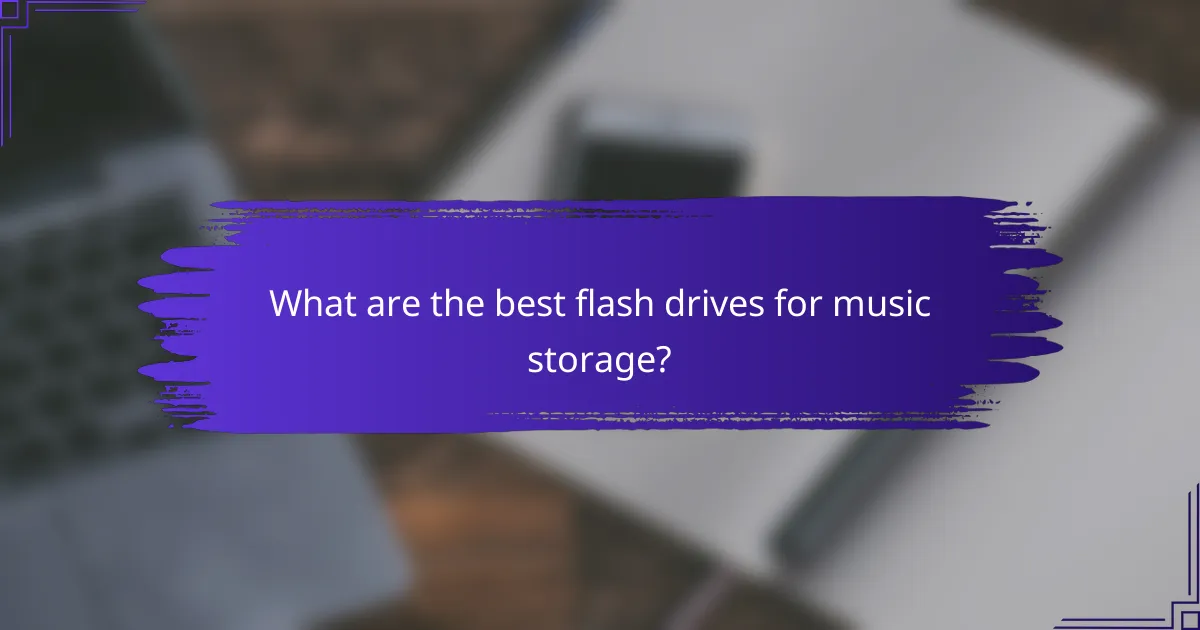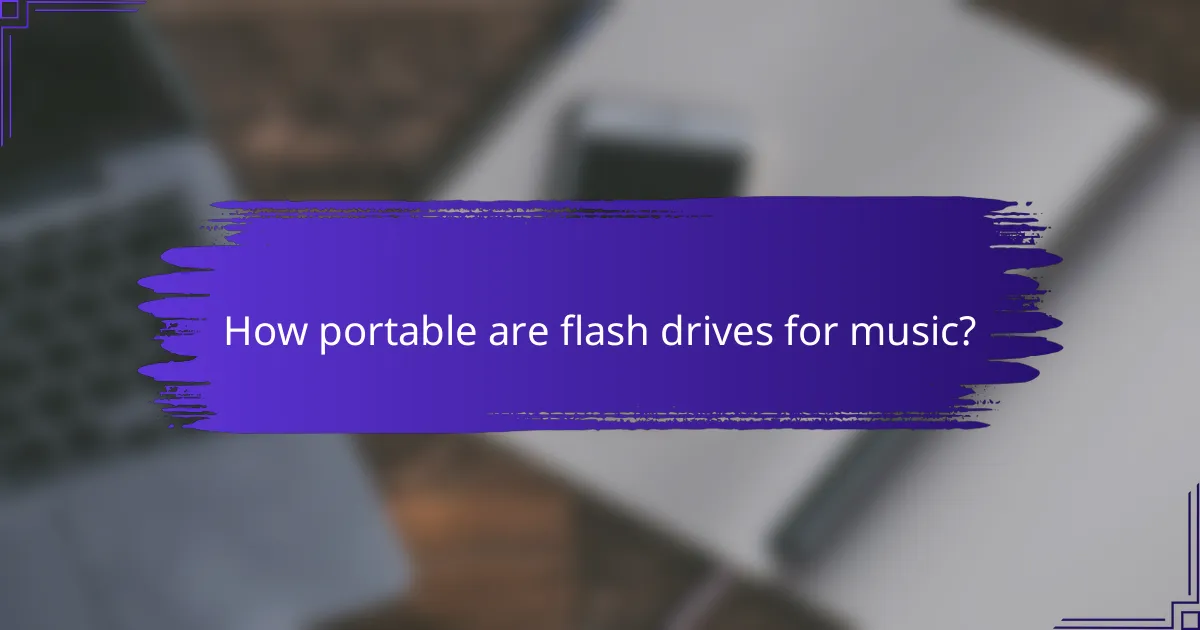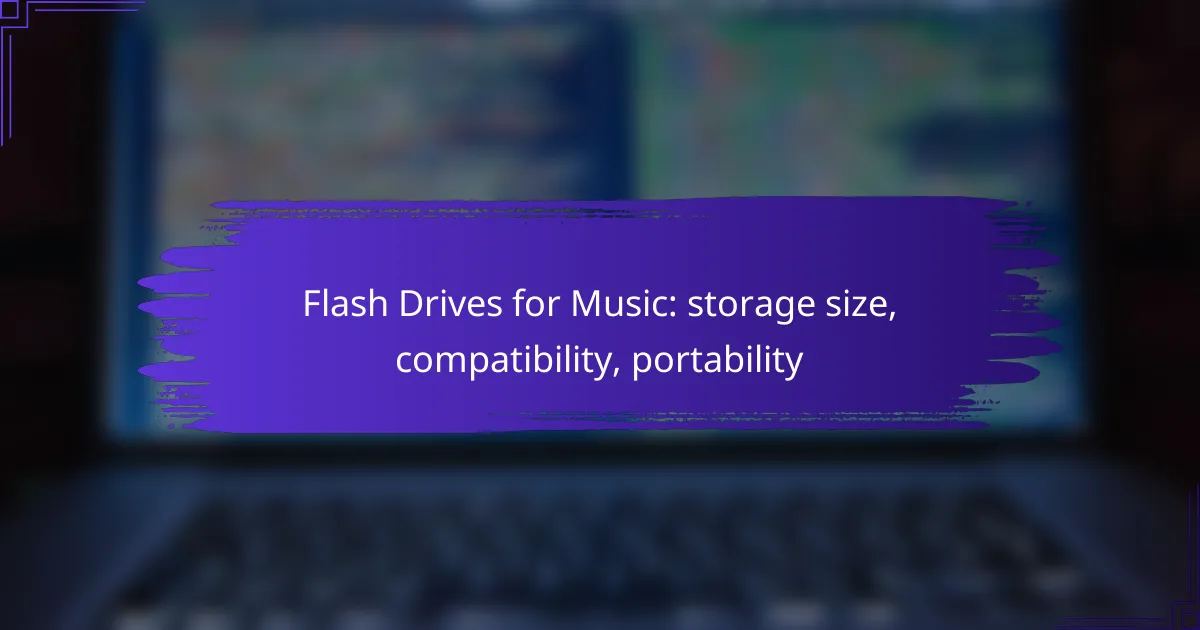When selecting a flash drive for music storage, it’s essential to consider storage size, compatibility, and portability. A minimum of 32GB is recommended to hold a substantial music library, while ensuring the drive is compatible with your devices, typically requiring FAT32 or exFAT formatting. Whether you’re a casual listener or an audiophile, the right flash drive can enhance your music experience on the go.

What are the best flash drives for music storage?
The best flash drives for music storage combine ample capacity, compatibility with various devices, and portability. Look for options that offer at least 32GB of storage to accommodate a sizable music library while ensuring they work seamlessly with your devices.
SanDisk Ultra Flair 128GB
The SanDisk Ultra Flair 128GB flash drive is an excellent choice for music storage due to its high capacity and fast transfer speeds. With USB 3.0 support, it can transfer files in seconds, making it ideal for quickly moving large music files or entire playlists.
This drive is compatible with most operating systems, including Windows and macOS, ensuring that you can easily access your music on various devices. Its sleek design also enhances portability, allowing you to carry it in your pocket or bag without hassle.
Samsung BAR Plus 64GB
The Samsung BAR Plus 64GB offers a robust and stylish option for music enthusiasts. Its metal casing not only provides durability but also features a compact design that makes it easy to transport. With USB 3.1 technology, it delivers impressive read speeds, ensuring that you can access your music files quickly.
This flash drive is compatible with a wide range of devices, including laptops, desktops, and even some car audio systems, making it versatile for different listening environments. Its water, shock, and temperature resistance add an extra layer of reliability for on-the-go use.
Kingston DataTraveler 100 G3 32GB
The Kingston DataTraveler 100 G3 32GB is a budget-friendly option for those who need a reliable flash drive for music storage. While its capacity is lower than some competitors, it still provides enough space for a substantial collection of songs. The USB 3.0 interface ensures decent transfer speeds for most users.
This drive is compatible with various operating systems and is particularly user-friendly, making it suitable for anyone looking to store and play music without technical complications. Its compact size makes it easy to carry, perfect for music lovers on the move.
Lexar JumpDrive S75 64GB
The Lexar JumpDrive S75 64GB is another solid choice for music storage, offering a good balance of capacity and performance. With USB 3.0 support, it allows for quick file transfers, which is essential when managing large music libraries.
This flash drive is compatible with both Windows and macOS, ensuring that you can easily access your music files across different platforms. Its sleek design and lightweight nature make it convenient for everyday use, whether you’re at home or traveling.

How much storage do I need for music?
The amount of storage you need for music depends on your listening habits and the quality of the audio files. For casual listeners, smaller capacities may suffice, while audiophiles or those with extensive libraries will require more storage to accommodate high-resolution files.
32GB for casual listening
A 32GB flash drive is suitable for casual listeners who enjoy a moderate selection of music. This capacity can typically hold around 7,000 to 8,000 songs in standard quality (MP3 format at 128 kbps).
For those who primarily stream music or only occasionally download songs, a 32GB drive provides ample space without overwhelming options. It’s a practical choice for everyday use, such as commuting or exercising.
64GB for extensive libraries
If you have a larger music collection, a 64GB flash drive is a better fit. This size can store approximately 15,000 to 16,000 songs, making it ideal for users who want a diverse range of genres and artists readily available.
This capacity is also beneficial for those who enjoy downloading albums and playlists for offline listening. It strikes a balance between storage space and portability, allowing you to carry a significant library without bulk.
128GB for high-resolution audio
A 128GB flash drive is perfect for audiophiles or those who prefer high-resolution audio formats. This size can accommodate around 30,000 songs, especially if you use lossless formats like FLAC or ALAC, which take up more space.
With this capacity, you can store entire albums in high quality, ensuring that you experience the full richness of the music. It’s an excellent option for dedicated music lovers who prioritize sound quality and want to keep a vast library on hand.

What flash drive formats are compatible with music players?
Most music players are compatible with flash drives formatted in FAT32 or exFAT. Choosing the right format depends on the size of your music files and the specific requirements of your device.
FAT32 for most devices
FAT32 is widely supported across various music players, making it a safe choice for compatibility. This format allows for file sizes up to 4 GB, which is sufficient for standard audio files and playlists.
When using FAT32, ensure that your flash drive is properly formatted before transferring music. Most operating systems provide easy options to format drives, typically found in the disk management settings.
exFAT for larger files
exFAT is ideal for larger music files, especially those in high-resolution formats. This format supports file sizes beyond 4 GB, making it suitable for extensive music libraries or high-quality audio files.
While exFAT is compatible with many modern devices, some older music players may not support it. Always check your device specifications before formatting your flash drive to avoid compatibility issues.

How portable are flash drives for music?
Flash drives for music are highly portable, making them an ideal choice for music lovers on the go. Their compact design and lightweight nature allow for easy transport, whether in a pocket, bag, or on a keychain.
Compact size for easy transport
The compact size of flash drives makes them convenient for carrying music files anywhere. Most flash drives are small enough to fit in the palm of your hand, often measuring just a few centimeters in length. This allows users to store them in various locations without taking up much space.
When selecting a flash drive, consider options that are slim and sleek, which can easily slide into pockets or attach to keychains. This ensures that you always have your music collection readily available without the bulk of larger storage devices.
Lightweight for convenience
Flash drives are incredibly lightweight, typically weighing only a few grams. This minimal weight means they won’t add significant bulk to your bag or pocket, making them perfect for travel or daily commutes.
For those who frequently move between locations, such as from home to the gym or office, the lightweight nature of flash drives allows for hassle-free transport. Opting for a flash drive that is both compact and lightweight enhances your overall music-listening experience, ensuring you can enjoy your favorite tracks anytime, anywhere.

What are the key features to consider when buying a flash drive for music?
When selecting a flash drive for music, consider transfer speed, durability, and brand reliability. These features significantly impact your experience, from how quickly you can transfer files to how well the drive withstands wear and tear.
Transfer speed
Transfer speed is crucial for efficiently moving large music files. Look for flash drives that offer USB 3.0 or higher, as they typically provide faster data transfer rates compared to USB 2.0 drives. Speeds can vary widely, but good options often range from 100 MB/s to 400 MB/s.
For music libraries, especially those with high-resolution audio files, a faster drive can save you time. Consider your needs: if you frequently transfer large batches of files, prioritize higher speeds.
Durability
Durability is essential for a flash drive that will be used frequently. Look for drives that are shock-resistant and water-resistant to protect your data from accidental drops or spills. Some models even offer metal casings for added sturdiness.
Keep in mind that a durable flash drive can withstand daily wear and tear, making it a better long-term investment. If you plan to carry it in your pocket or bag, choose one designed for portability and resilience.
Brand reliability
Brand reliability plays a significant role in the performance and longevity of your flash drive. Established brands often provide better customer support and warranty options, which can be crucial if you encounter issues. Look for brands with positive reviews and a reputation for quality.
Researching user experiences can help you avoid unreliable products. Investing in a reputable brand may cost slightly more upfront but can save you from potential data loss and frustration later on.

What are the advantages of using flash drives for music?
Flash drives offer significant advantages for music storage, including portability, compatibility with various devices, and easy access to your music library. They are compact and lightweight, making them ideal for on-the-go listening while providing ample storage space for thousands of songs.
Easy access to music files
Using flash drives for music allows for quick and convenient access to your favorite tracks. Most flash drives are compatible with computers, car audio systems, and portable speakers, enabling you to play music wherever you are. Simply plug the drive into a USB port, and your music files are ready to go.
When selecting a flash drive, consider storage sizes ranging from 8GB to 256GB or more, depending on your music library. A larger capacity drive can store thousands of songs in various formats, ensuring you have your entire collection at your fingertips.
Backup for digital libraries
Flash drives serve as an excellent backup solution for your digital music libraries. By regularly transferring your music files to a flash drive, you can protect your collection from data loss due to hardware failure or accidental deletion. This is especially important for those who have invested time and money in building their music libraries.
To ensure effective backups, consider using multiple flash drives or cloud storage in conjunction with your flash drive. This redundancy helps safeguard your music files against unforeseen issues, providing peace of mind while enjoying your favorite tunes.
